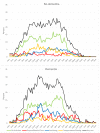A day in the life of caregivers to older adults with and without dementia: Comparisons of care time and emotional health
- PMID: 35103394
- PMCID: PMC9339593
- DOI: 10.1002/alz.12550
A day in the life of caregivers to older adults with and without dementia: Comparisons of care time and emotional health
Abstract
Introduction: How care-related time and emotional health over the day differ for those assisting older adults with and without dementia is unclear.
Methods: Using 2134 time diaries from the National Study of Caregiving, we compared emotional health and care time for caregivers of older adults with and without dementia.
Results: Caregivers to older adults with dementia experienced worse (higher scores) on a composite measure of negative emotional health (4.2 vs 3.3; P < .05) and provided more physical/medical care (33.7 vs 16.2 minutes; P < .05) and less transportation assistance (12.6 vs 24.8 minutes; P < .05) than other caregivers. In models, providing physical/medical care was associated with worse emotional health (β = 0.15; P < .01) and socializing with the care recipient was associated with worse emotional health when the recipient had dementia (β = 0.28; P < .01).
Discussion: Findings highlight the opportunity for targeted interventions to address the emotional consequences of different types of care time in the context of dementia.
Keywords: care activities; dementia; emotional health; family caregiving; time use; well-being.
© 2021 the Alzheimer's Association.
Conflict of interest statement
The National institute on Aging provided funding for this work through grants to the University of Michigan. Vicki Freedman and Sarah Patterson received funding from other grants from the National Institute on Aging made to the University of Michigan. Vicki Freedman received consulting fees from the American Enterprise Institute/Brookings and support for attending meetings and/or travel from American Enterprise Institute/Brookings and the National Academies of Science, Medicine and Engineering. Vicki Freedman also has served on advisory boards for research centers at Johns Hopkins University and the University of Michigan. Sarah Patterson received support for attending meetings and/or travel from the University of Michigan and served as an editorial board member for the Journals of Gerontology: Series B, Social Sciences. Jennifer Cornman had contracts with the University of Michigan and Georgetown University and provided consulting services to the University of Michigan. Jennifer Wolf received funding from grants from the National Institute on Aging, the Commonwealth Fund, and the John A. Hartford Foundation made to Johns Hopkins University, consulting fees from Yale University and the Mayo Clinic, and served on advisory boards for National Academy for State Health Policy (NASHP) and Rush.
Figures


